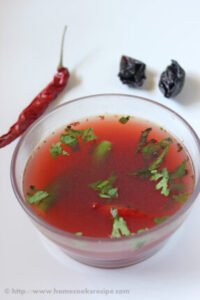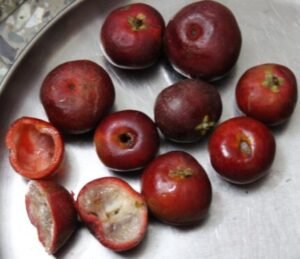Medically reviewed by Dr. Ramesh Gaddam, M.D. — Written by Sumalatha, D.N.H.E
Kokum is a fruit tree found in India’s Western Ghats region, known scientifically as Garcinia indica. It’s also called kokam, kokum butter tree, and mangosteen oil tree. The fruit is small, round, and purple when ripe, with a sour taste. It’s used in Indian cooking, especially in Maharashtra, Karnataka, and Goa, to add a tangy flavor.
Nutrition of Kokum
Nutrition of kokum per 100 grams:
| Nutrient | Amount |
|---|---|
| Calories | 60 |
| Total Fat | 0.3 grams |
| Saturated Fat | 0 grams |
| Cholesterol | 0 milligrams |
| Sodium | 10 milligrams |
| Potassium | 300 milligrams |
| Total Carbohydrates | 15 grams |
| Dietary Fiber | 5 grams |
| Sugars | 0 grams |
| Protein | 1 gram |
| Vitamin C | 23 milligrams |
| Vitamin B6 | 0.06 milligrams |
| Iron | 1 milligram |
| Calcium | 11 milligrams |
| Magnesium | 13 milligrams |
Benefits of Kukum
Kokum offers several potential health benefits due to its nutritional composition and bioactive compounds.

Some of the potential benefits of kokum include:
Packed with Antioxidants:
Kokum has lots of things called antioxidants that help keep your body healthy by fighting off harmful substances.
Helps with Digestion:
Eating kokum can make your stomach work better, which means you won’t feel as bloated or uncomfortable after meals.
Can Help with Weight:
Kokum has something called hydroxycitric acid (HCA) that might help you lose weight by stopping your body from storing fat.
Good for Achy Joints:
Kokum can help with things like arthritis or sore joints because it can make swelling and pain go down.
Keeps Your Heart Happy:
Eating kokum can be good for your heart because it doesn’t have bad stuff like cholesterol, and it has things that can keep your heart healthy.
Fights Off Sickness:
Kokum has vitamin C that can help your body fight off sicknesses like colds or infections.
Great for Staying Hydrated:
Drinking kokum juice can help you stay hydrated and feel refreshed, especially on hot days.
Makes Your Skin Nice:
Kokum butter, which comes from kokum seeds, is really good for your skin because it helps keep it soft and moisturized.
Gives Hair a Boost:
Kokum butter is also good for your hair because it can make it stronger and shinier, and it helps with things like frizz.
While kokum can be good for you, it’s best to eat it as part of a healthy diet. If you’re not sure if it’s right for you, it’s a good idea to talk to a doctor first.
Uses of Kokum
Kokum, also known as Garcinia indica, is a fruit-bearing tree native to the Western Ghats region of India.

It has several culinary and medicinal uses:
Flavoring Agent:
Kokum is often used as a souring agent in Indian cooking, especially in places like Maharashtra, Goa, and parts of Gujarat and Karnataka. It adds a tangy taste to dishes.
Condiment:
Kokum is used to make kokum sherbet or kokum juice, a tasty drink enjoyed during hot summers. To make it, kokum is soaked in water with sugar and spices.
Preservative:
Kokum is added to pickles, chutneys, and preserves for its sour flavor and ability to preserve food.
Digestive Aid:
Kokum is thought to help with digestion and ease acidity. People often have it after meals as a tonic for digestion.
Cooling Properties:
In Ayurvedic medicine, kokum is seen as cooling and is used to help with conditions caused by heat, like sunstroke.
Antioxidant Properties:
Kokum has antioxidants that can help fight off harmful substances in the body and reduce swelling.
Weight Loss:
Some research suggests that kokum might help with losing weight by making you feel less hungry and stopping your body from storing fat.
Skin Care:
Kokum butter, made from kokum seeds, is used in skincare products because it keeps skin moisturized and soft.
Cosmetics:
Kokum butter is a common ingredient in skincare products like creams, lotions, and lip balms because it moisturizes the skin well.
Pharmaceuticals:
Pharmaceutical companies use extracts from kokum in their medicines because of its healing properties.
Traditional Practices:
In some traditional Indian households, kokum is used in home remedies for various ailments like colds, coughs, and indigestion.
Kokum extract is sometimes applied topically to soothe skin irritations and minor burns.
Side Effects of Kokum
While kokum is generally considered safe for most people, when consumed in moderate amounts as part of a balanced diet.

There are a few potential side effects to be aware of:
Allergic Reactions:
Some people might be allergic to kokum or its parts.
Allergic reactions can range from mild symptoms like itching or hives to more severe ones like swelling of the face, lips, or tongue, difficulty breathing, or anaphylaxis.
Digestive Issues:
While kokum is known to help with digestion, having too much of it can cause stomach problems like upset stomach, bloating, or diarrhea in some people.
Blood Sugar Levels:
Kokum could affect blood sugar levels, especially for people with diabetes.
If you have diabetes or take medications for it, keep an eye on your blood sugar levels when having kokum or products with kokum.
Interactions with Medications:
Kokum supplements or extracts might not mix well with certain medications.
For example, it could increase the risk of bleeding if you’re taking blood thinners like warfarin or aspirin.
It’s important to talk to your doctor before taking kokum supplements, especially if you’re on medication.
Pregnancy and Breastfeeding:
We don’t know much about how safe kokum is during pregnancy or breastfeeding.
While it’s okay to have kokum in food amounts, it’s best to check with a doctor before using kokum supplements or extracts during pregnancy or breastfeeding.
Low Blood Pressure:
Kokum might lower blood pressure levels.
If you already have low blood pressure, be careful with kokum or products with kokum, as it could drop your blood pressure even more.
Overconsumption:
Having too much kokum, like with any food or supplement, could cause problems.
It’s important to stick to recommended amounts and not overdo it.
Benefits of Kokum Juice:
Potential Benefits of Kokum juice are as follows:

Digestive Health:
Kokum juice is famous for its digestive benefits. It boosts the release of digestive enzymes, helping with digestion and easing problems like acidity, bloating, and constipation.
Hydration:
Refreshing and hydrating, kokum juice is perfect for quenching thirst, especially in hot weather. It replaces electrolytes and prevents dehydration.
Weight Management:
Kokum has hydroxycitric acid (HCA), which might block an enzyme involved in fat storage. Drinking kokum juice regularly, alongside a healthy diet and exercise, could help manage weight.
Antioxidant Properties:
Loaded with antioxidants like vitamin C and garcinol, kokum fights off harmful free radicals. This lowers oxidative stress and reduces the risk of chronic diseases.
Skin Health:
Thanks to its antioxidants, kokum juice benefits skin health. It shields the skin from free radical damage, leading to a healthy, radiant complexion.
Side Effects of Kokum Juice:
Potential Side Effects of Kokum juice are as follows:

Allergic Reactions:
Some people might be allergic to kokum or its parts.
Symptoms can range from mild, like itching or hives, to severe, like swelling of the face or difficulty breathing. Seek medical help if you have a severe reaction.
Digestive Issues:
While kokum juice is usually good for digestion.
But having too much might cause stomach problems like upset stomach, bloating, or diarrhea in some people.
Blood Sugar Levels:
Kokum can affect blood sugar levels, especially for those with diabetes.
If you have diabetes or take medications for it, keep an eye on your blood sugar levels when drinking kokum juice.
Interactions with Medications:
Kokum juice might not mix well with certain medications, especially blood thinners or antiplatelet drugs.
Talk to your doctor before drinking kokum juice if you’re on medication.
Overconsumption:
Having too much kokum juice, like with any food or drink, could cause problems.
It’s important to stick to recommended amounts and not overdo it.
Kokum Butter Benefits for Hair
Yes, kokum butter is beneficial for hair and is often used in hair care products for its conditioning and nourishing properties.

Here are some reasons why kokum butter is good for hair:
Moisturizing:
Kokum butter has lots of fatty acids that help keep hair and the scalp moisturized.
It goes deep into the hair, making dry and damaged hair hydrated and leaving it soft and smooth.
Nourishing:
With its vitamins and antioxidants, kokum butter feeds the hair follicles, helping hair grow healthy.
It also strengthens hair, reducing breakage and split ends.
Emollient:
Kokum butter is great at forming a protective layer on hair, locking in moisture and stopping it from drying out.
This keeps hair hydrated and stops it from getting dry and fragile.
Anti-inflammatory:
Thanks to its natural anti-inflammatory powers, kokum butter can calm the scalp and ease irritation.
It’s helpful for people with sensitive or itchy scalps.
Styling Aid:
Kokum butter can replace store-bought hair styling products.
It gives a light hold and tames frizz and flyaways without making hair oily or heavy.
Adds Shine:
Using kokum butter makes hair naturally shiny, giving it a healthy and glossy look.
It smooths the outer layer of hair, reflecting light and boosting its natural shine.
Suitable for All Hair Types:
Kokum butter is light and not greasy, so it works well for any hair type, even fine or oily hair.
It conditions hair without weighing it down, making it perfect for everyday use.
Kokum Butter Benefits for Skin
Here are some of the Benefits of kokum butter for skin:

Moisturizing:
Kokum butter is packed with fatty acids that deeply moisturize the skin.
It sinks in quickly without leaving any oily residue, perfect for all skin types, even dry or sensitive skin.
Nourishing:
Loaded with vitamins A, E, and C, kokum butter feeds the skin, keeping it healthy.
These vitamins shield the skin from damage and maintain its youthful glow.
Soothing:
Thanks to its natural anti-inflammatory powers, kokum butter calms irritated skin.
It’s great for conditions like eczema, psoriasis, and dermatitis.
Healing:
Kokum butter’s antioxidants help repair damaged skin and heal wounds, cuts, and scars.
It can also fade scars and stretch marks with regular use.
Anti-aging:
The antioxidants in kokum butter battle free radicals that cause premature aging.
Regular use can reduce wrinkles, fine lines, and age spots, giving you younger-looking skin.
Softening:
Kokum butter makes skin soft and smooth, improving its texture.
It restores moisture balance and prevents dryness and flakiness.
Non-comedogenic:
Kokum butter won’t clog pores or cause acne, making it safe for face and body use.
Stabilizing:
Kokum butter is stable, so it doesn’t go bad quickly.
You can store it for a long time without losing its goodness.
Medically reviewed by Dr. Ramesh Gaddam, M.D.

General Physician, Diabetologist, and Critical Care Specialist.
Discover more from Health Build-Up
Subscribe to get the latest posts sent to your email.

1 thought on “Kokum: Benefits, Nutrition, Juice, Uses, Side Effects”
Comments are closed.